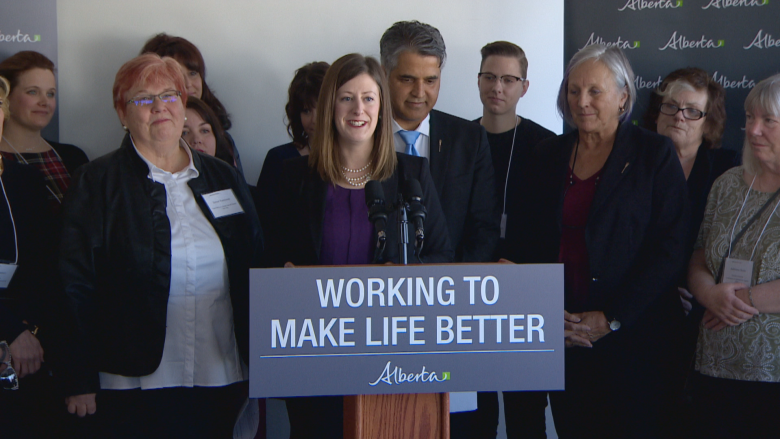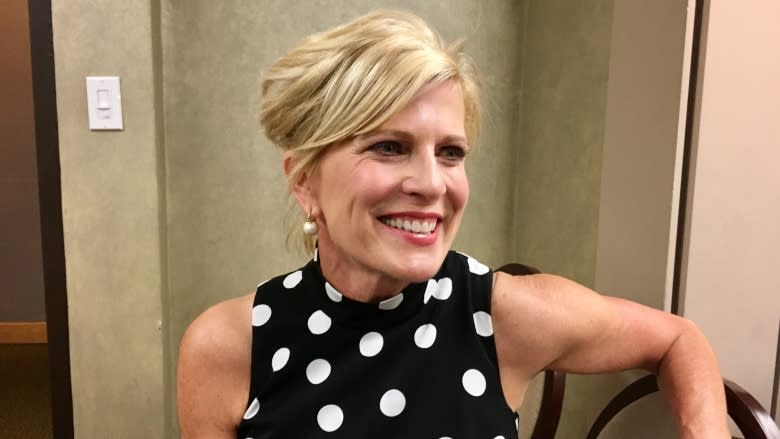Alberta adds $8.1M in new money for sexual assault services
Fifteen years ago, Carlynn McAneeley was raped by a trusted friend on the campus of her university.
She was 18 and fresh into university, and after it happened, she felt like she did everything right. McAneeley went to campus police and reported the incident.
She was initially told not to report it to police, and when campus police decided not to investigate the incident, she didn't want to have to prove herself to a second set of strangers at the police station.
McAneeley ended up dropping out of school, while the man who sexually assaulted her ended up finishing his PhD.
But where others failed her, the Sexual Assault Centre of Edmonton (SACE) was there.
"My life oozes privilege and I still don't think that I would be here without the support I received from the Sexual Assault Centre of Edmonton," McAneeley told CBC's Radio Active Wednesday. "I was believed from the minute I walked in the door."
The Alberta government announced this week it will spend an additional $8.1 million to ensure sexual assault survivors get the supports they need. Of the total, more than $6.2 million will go to seven under-served regions:
- Northwest – High Level, High Prairie, Peavine, Rainbow Lake, Fort Vermilion.
- Northeast – Fort Chipewyan, Fort McKay, Janvier.
- North-central – Wabasca, Slave Lake, Athabasca.
- Central-west – Hinton, Jasper, Edson.
- Central-east – Bonnyville, Cold Lake, St. Paul, Lac La Biche.
- Bow Valley – Canmore, Banff, Lake Louise.
- Southwest – Lethbridge, Cardston, Taber, Pincher Creek.
More than $1 million will go to police and court support services across the province, and $750,000 will go to specialized counselling and expanded services.
SACE executive director Mary Jane James said she and her colleagues across the province had been lobbying for additional funds, but she didn't expect this much.
"Right now, I'm still reeling from the shock and emotion of it all," James told CBC's Radio Active Wednesday. "We were cautiously optimistic that they were listening and they were going to try to do something, but we didn't expect what we got."
According to SACE, one in three women and one in six men will be affected by some form of sexual violence during their lifetime.
Right now, there is an average wait time of six to eight months for sexual assault survivors seeking help at SACE. In the past year alone, the list of survivors seeking help has more than doubled.
James said the increased response is encouraging but with the wait times so high, it was overwhelming.
"When people get up the courage to reach out for the help that they want, they do not want to met with, you know, 'There's a six- to eight-month wait list,'" she said.
"We just can't keep up."
The newly awarded money will go toward knocking those wait times down, as well as reaching out to marginalized communities, who James said "face significant barriers in coming forward to telling their stories and getting the help they need."
James said a lot of work needs to be done in rural Alberta as well. "There are very sketchy services to begin with and certainly [sexual violence] education is not something that's delivered in the schools with any regularity at all," she said.
'A real sea change'
Fifteen years after she was sexually assaulted, McAneeley now works as a principal for Haubner Motashaw Consulting.
She's also considering filing a police report for the sexual violence she faced in university.
That thought is a product of the recent widespread conversations being had, including the #TimesUp and #MeToo movements.
"I never thought that reporting to the police would be part of my healing journey, but we're starting to create a culture of believing," she said. "It's not perfect yet, obviously, but there's just been a real sea change where we're moving toward that culture of believing and supporting survivors."
McAneeley said with most universities either having or developing sexual violence policies, it's an encouraging step forward in curbing what happened to her. "I'd like to hope that it's changing there, too," she said.
James said McAneeley's willingness to speak out while she continues to heal is commendable — and a story she hopes others will hear and be inspired by. James said the money will go a long way in helping victims recover.
"We feel very strongly that when people do get the help and support they need — and Carlynn is a wonderful example of that — that they do heal and they can heal," she said.
"It doesn't have to be the definition of the rest of your life."



